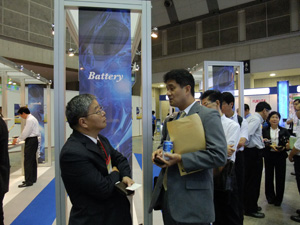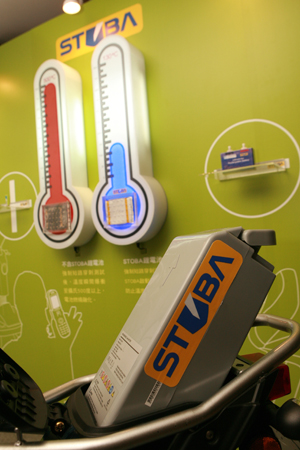Taiwan's ITRI and Makers Showcase STOBA at Techno-Frontier 2012
Many visitors attracted to Taiwan exhibitors’ zone in Tokyo
2012/08/29 | By Quincy Liang
To promote lithium-ion battery products made in Taiwan, the island’s Industrial Technology Research Institute (ITRI) recently organized several local makers using STOBA (Self Terminated Oligomers with hyper-Branched Architecture) technology to attend the Techno-Frontier 2012, an exhibition of innovative electro-mechanical parts and devices in Tokyo, Japan, held July 11-13.
The battery makers, including Amita Technologies Inc., E-One Moli Energy Corp., SYNergy ScienTech Corp., Lion Tech Co., Ltd., and J.S. Power Co., Ltd., formed the "Taiwan STOBA" zone to showcase the ITRI-developed advanced battery technology and 26 STOBA-inside lithium-ion battery products, which attracted ample attention from Japanese battery makers, UPS companies and vehicle manufacturers to create considerable buzz amid mainstream Japanese media.
J.P. Pan, section chief of Material and Chemical Research Laboratories (MCL) under ITRI, said the STOBA zone is the first-ever overseas promotional activity for "STOBA inside" products, with the exhibits including mobile power for cellphones, 3D glasses, iPads, game consoles etc., as well as UPS and battery packs for electric bicycles and electric scooters. Demonstrating in the Techno-Frontier, Pan added, lithium-ion batteries using STOBA technology featuring high levels of quality and safety will help to tap high value-added battery supply chains in Japan.
STOBA Technology
According to ITRI, STOBA is a nano-grade, high-molecular material integrated in lithium batteries to automatically form a protective film. When a lithium battery is overheated, impacted or pierced, STOBA immediately stops electro-chemical reactions hence triggered to prevent short-circuiting that generates excessive heat, consequent fire hazards to achieve significant safety upgrade. So STOBA-integrated lithium batteries are much safer for 3C (computer, communication, and consumer electronics) or electrical vehicles (EV).
STOBA has been tested for shorting and piercing in experiments that surpass international safety standards, and currently STOBA is the only technology worldwide using innovative, nano-grade material to fundamentally overcome safety issues related to lithium batteries.
ITRI is quite confident that STOBA is an excellent way to upgrade Li-ion battery safety, especially in high-power applications as EVs. Such technological breakthrough may be an once-in-a-lifetime chance for Taiwan-made Li-ion battery technology to possibly overtake Japan and South Korea.
Shorts Remain Decisive
Every major international player in the Li-ion battery business vies to overcome safety issues. Some choose to increase thickness of separator film, some improve formula of electrolyte, industry experts say, but internal short circuits remain decisive, because extended usage tends to cause chemical reactions or other changes that pierce separator films to short Li-cells.
STOBA is not only an advanced technology, but also versatile, evolving concept that can help improve different Li-ion batteries through using various polymeric formulae. For example, such technology can make LiFePO4, generally deemed the safest, even safer when wired for high voltage, or effectively eliminate many potential risks of lithium-manganese (Li-Mn) cells at lower cost. So Taiwan-made, STOBA-integrated Li-ion batteries have the potential to win bigger global market shares.
ITRI began transferring the patented STOBA technology to local Li-ion battery makers in 2009. This year, these companies have developed a wide array of products, including an 3.2kw intelligent power storage system that automatically self-charges at off-peak time and discharges at peak time; a 260kw emergency power supply system; 1,500-4,000 mAh polymer battery for mobile devices; and batteries for information and communication technology, electric tool, and electric-vehicle applications.




